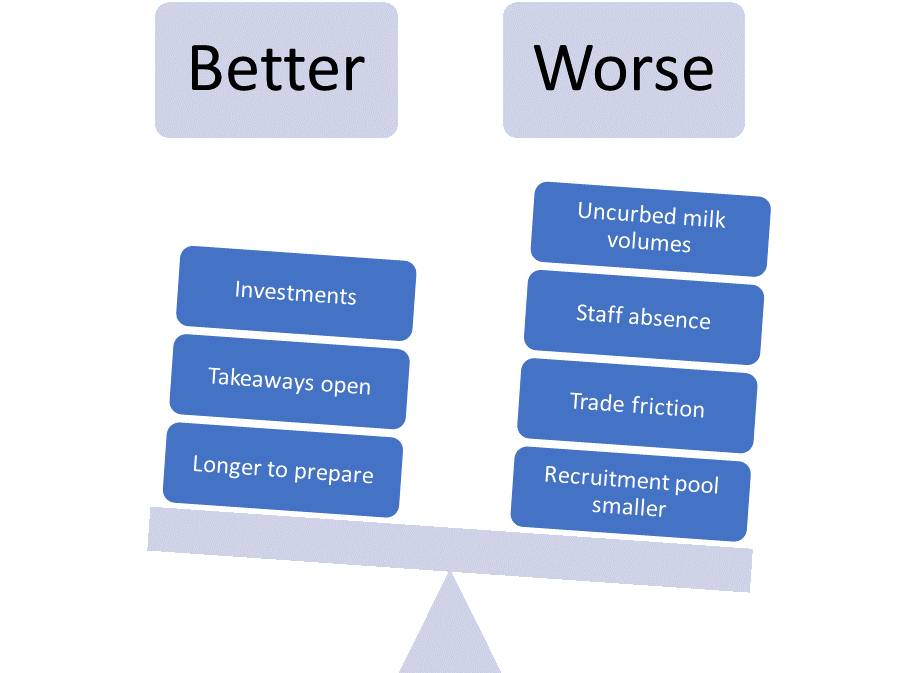How long can the dairy industry handle a third lockdown?
Wednesday, 13 January 2021
By Chris Gooderham
As the country enters its third lockdown, and milk production slowly starts to rise, we take a look at when the curtailment of foodservice might start to stretch processing capability once again.
During the first lockdown, the uplift in retail sales and an industry led marketing campaign, helped offset losses from out of home sales. That meant overall processing capability in GB settled at around 36.9m litres per day. By farmers curbing milk production by 75m litres, volumes stayed within this limit for most of the spring, saving the industry from widespread milk disposals.
What will happen if volumes rise as normal this year?
Based on our latest milk production forecast, volumes in the country would exceed the 36.9m litres limit at the end of the second week of April 2021. However, there are a number of factors affecting processing capability that could change the 36.9m litres per day average seen through the first lockdown.

On the positive side:
- Takeaways were closed for much of the first lockdown, whereas takeaways are allowed to remain open at the moment.
- Companies have had more time to prepare for any issues this time round, and will have procedures in place to minimise disruption in the factories.
- Investments in processing over the last year will have lifted capability marginally.
On the negative side:
- Capacity was constrained by an estimated 2% during the worst affected weeks in April 2020 due to staff absence in processing sites. The latest outbreak is reportedly far worse in terms of the number of positive cases compared with the first lockdown. Therefore, we could expect the impact on staff levels to be more significant this time round, and to be a challenge across the whole supply chain.
- Based on our forecast, milk production is due to reach 38m litres per day by early May. If this remains uncurbed it would require an extra million litres capacity per day above the limit seen last year.
- Despite the last minute trade agreement with the EU, there are still challenges with exporting, compared with the frictionless trade of last spring. This, plus restrictions put on the UK because of the new coronavirus variant, mean processors have fewer options for handling surplus milk, cream or skim concentrate.
- EU exit has also made it more challenging for bringing in migrant workers, so the size of the recruitment pool throughout the supply chain has reduced.
At first look, it may seem that the industry can get through the third lockdown provided things are eased by the start of April. However, in reality, much is going to depend on the incidence of coronavirus cases over the coming weeks and its impact on staff levels throughout the supply chain. Getting through the spring unscathed will also depend on the Government meeting its target for vaccinations, thereby helping to keep staff absence at a manageable level.

Sign up to receive the latest information from AHDB.
While AHDB seeks to ensure that the information contained on this webpage is accurate at the time of publication, no warranty is given in respect of the information and data provided. You are responsible for how you use the information. To the maximum extent permitted by law, AHDB accepts no liability for loss, damage or injury howsoever caused or suffered (including that caused by negligence) directly or indirectly in relation to the information or data provided in this publication.
All intellectual property rights in the information and data on this webpage belong to or are licensed by AHDB. You are authorised to use such information for your internal business purposes only and you must not provide this information to any other third parties, including further publication of the information, or for commercial gain in any way whatsoever without the prior written permission of AHDB for each third party disclosure, publication or commercial arrangement. For more information, please see our Terms of Use and Privacy Notice or contact the Director of Corporate Affairs at info@ahdb.org.uk © Agriculture and Horticulture Development Board. All rights reserved.

